Managing Psoriasis Flare-Ups: Tips for Seniors
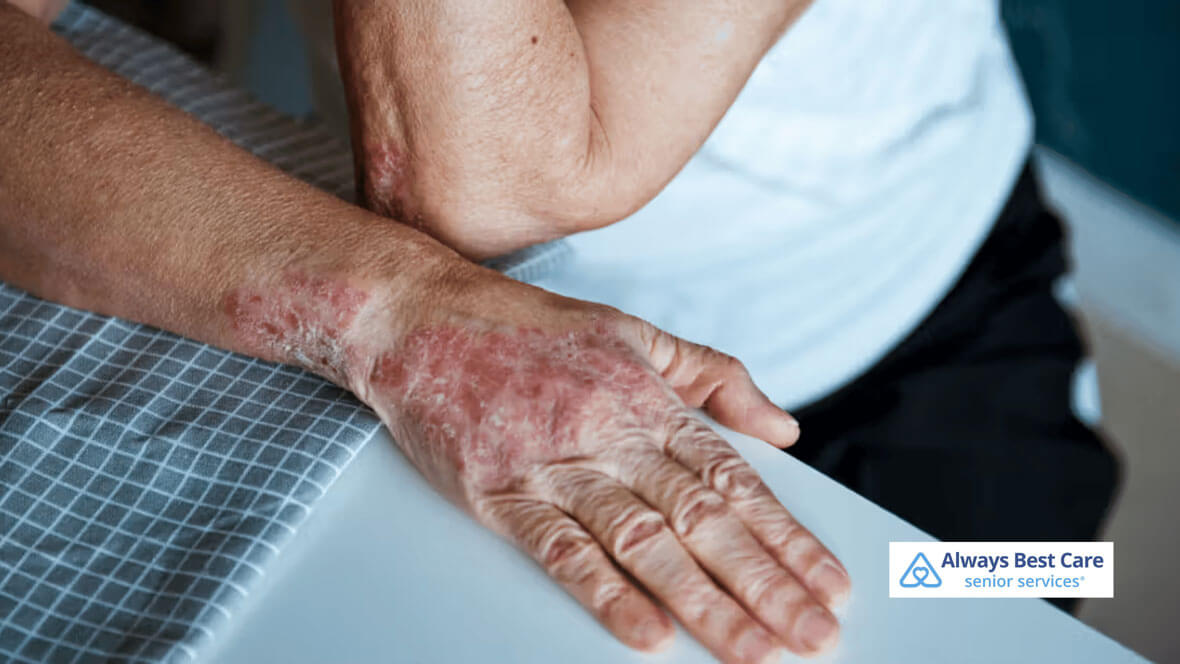
Psoriasis is a chronic autoimmune condition affecting around 7.5 million adults in the United States alone, including many seniors. Managing psoriasis can become increasingly challenging as we age due to changes in skin health, immune function, and overall lifestyle. Flare-ups can be particularly uncomfortable, leading to itching, pain, and emotional distress.
However, with the right strategies, seniors can effectively manage their symptoms and maintain a high quality of life. This guide will explore practical tips and techniques tailored specifically for seniors to help navigate and minimize psoriasis flare-ups, ensuring better skin health and overall well-being.
What is Psoriasis?
Psoriasis is a chronic condition in which the immune system mistakenly attacks healthy skin cells, accelerating their lifecycle. This rapid turnover leads to a build-up of cells on the skin’s surface, forming scales and red patches that can be itchy and sometimes painful.
Symptoms and Triggers
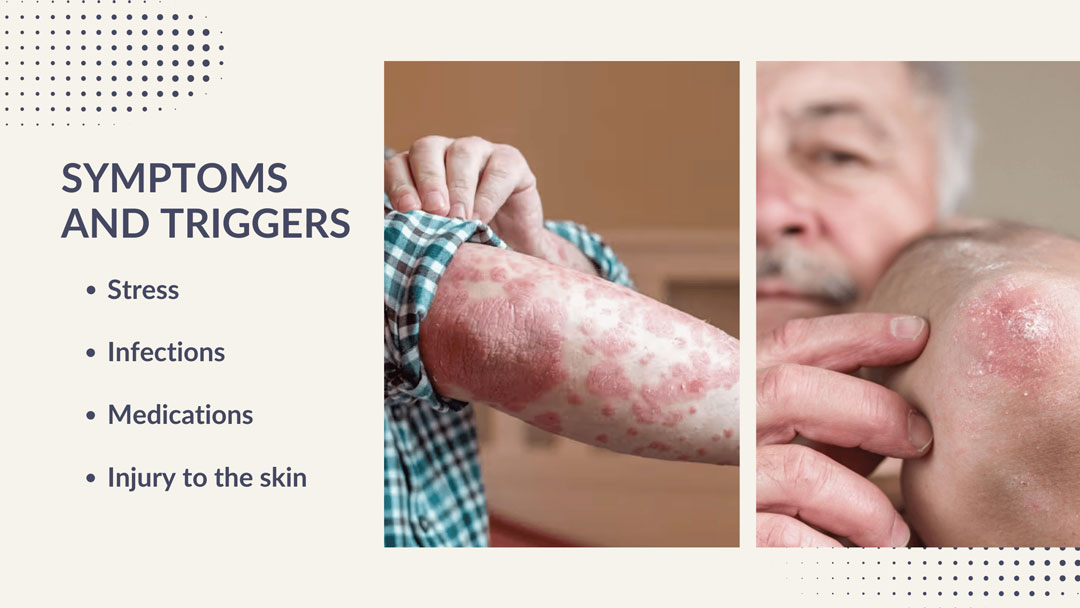
The symptoms of psoriasis can vary depending on the type but generally include red patches of skin covered with thick, silvery scales, dry and cracked skin that may bleed, and itching, burning, or soreness. Joint pain and stiffness are also common, especially in psoriatic arthritis.
Doctors are not certain about the exact causes of psoriasis, but they believe several factors play a role. Genetic predisposition and immune system dysfunction are significant contributors. Environmental triggers can also cause flare-ups, which may include:
- Stress: Physical or emotional stress can trigger or worsen psoriasis symptoms.
- Infections: Certain infections, such as strep throat, can trigger psoriasis.
- Medications: Drugs like lithium, antimalarials, and beta-blockers can provoke symptoms.
- Injury to the skin: Cuts, scrapes, or severe sunburn can trigger a psoriasis outbreak, a phenomenon known as the Koebner response.
Table of Contents
How to Avoid Common Triggers
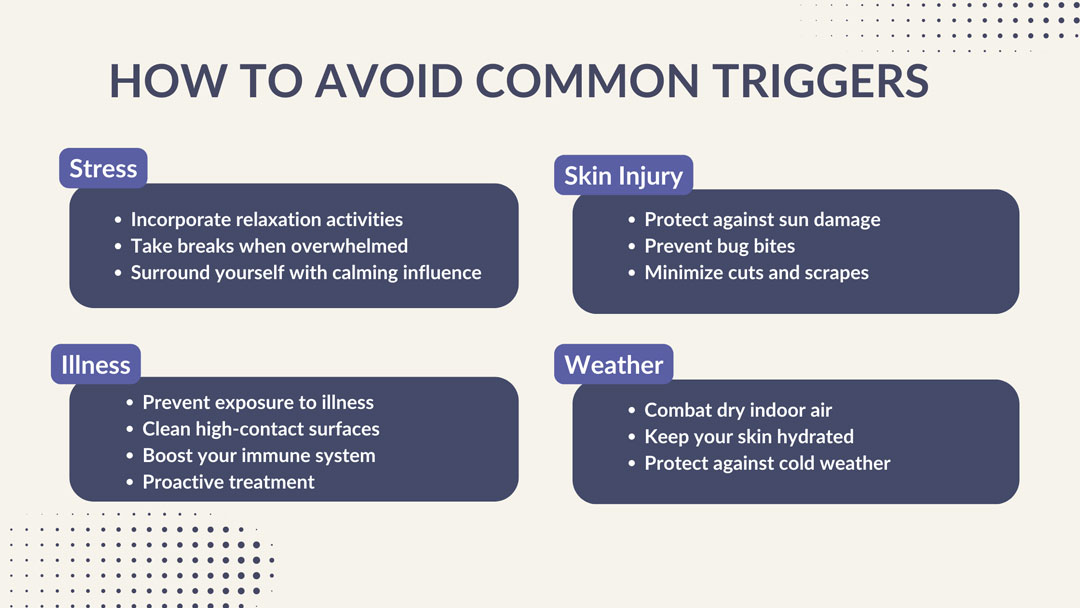
Identifying and avoiding common triggers can significantly help in managing psoriasis flare-ups. Paying close attention to your activities, emotional state, and any skin injuries before a flare-up can help you pinpoint potential triggers. Here are some common triggers and tips on how to avoid them:
Stress
- Incorporate relaxation activities into your daily routine: Try meditation, deep breathing exercises, yoga, or journaling.
- Take breaks when overwhelmed: If you start to feel stressed, take a moment to do something relaxing.
- Surround yourself with calming influences: Spend time with people who help you feel calm and avoid those who cause agitation and stress.
Illness
- Prevent exposure to illness: Avoid close contact with sick individuals and practice frequent hand washing.
- Clean high-contact surfaces: Regularly disinfect surfaces that are frequently touched.
- Boost your immune system: Include immune-boosting foods in your diet to enhance your body’s natural defenses.
- Proactive treatment: If you feel unwell, address it promptly to prevent worsening of symptoms.
Skin Injury
- Protect against sun damage: Use sunscreen and wear light layers when outdoors to shield your skin from harmful UV rays.
- Prevent bug bites: Apply bug repellent and use natural deterrents like citronella candles or fans in outdoor areas.
- Minimize cuts and scrapes: Be mindful of your surroundings and take precautions to avoid skin injuries.
Weather
- Combat dry indoor air: Use a humidifier during winter to add moisture to the air inside your home.
- Keep your skin hydrated: Regularly apply lotion to prevent dryness.
- Protect against cold weather: Wear warm clothing and layer up to protect your skin when you’re outside.
Managing Psoriasis Flare-Ups
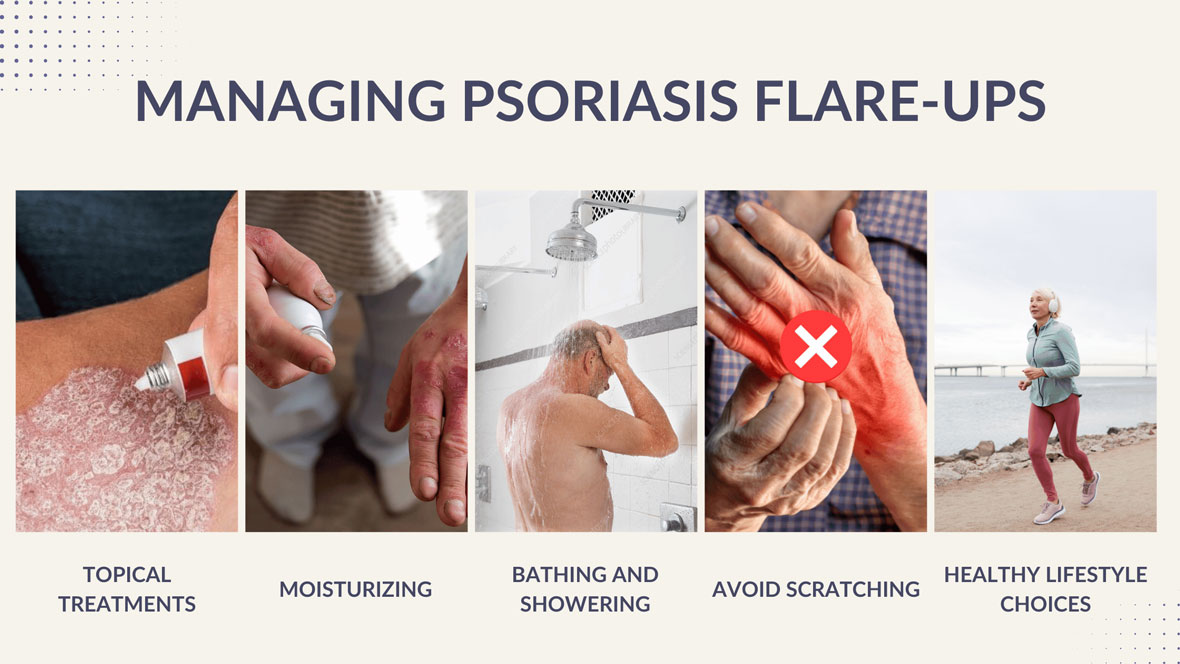
Managing psoriasis can become increasingly challenging as we age due to changes in skin health, immune function, and overall lifestyle. Flare-ups can be particularly uncomfortable, leading to itching, pain, and emotional distress. However, with the right strategies, seniors can effectively manage their symptoms and maintain a high quality of life. Here are a couple of tips to help manage psoriasis flare-ups:
Topical Treatments
For seniors, it’s important to use any topical ointments prescribed by your doctor to alleviate itching and reduce skin cell build-up. These ointments often contain steroids, vitamin D, or salicylic acid. Regular use as directed by a healthcare provider can significantly help manage the symptoms. Given the sensitivity of aging skin, it’s crucial to follow the prescribed application routine and avoid overuse, which can lead to thinning of the skin or other side effects.
Moisturizing
Keeping your skin hydrated throughout the day is vital. Use a nourishing lotion designed explicitly for psoriatic disease. Apply it whenever your skin feels dry or cracked to maintain moisture and prevent further irritation. Seniors might benefit from thicker, emollient-rich creams that provide longer-lasting hydration than lighter lotions. Incorporating a moisturizing routine in the morning and evening can help keep the skin supple and reduce the frequency of flare-ups.
Bathing and Showering
Opt for warm water instead of hot when showering or bathing, and limit your time to 10 minutes or less. Choose cleansers that are gentle on your skin and won’t cause dryness. Seniors should be particularly mindful of the products they use; hypoallergenic and fragrance-free cleansers are often the best choice. After bathing, apply moisturizer immediately to lock in moisture and keep your skin hydrated. Using a humidifier in the home can also help maintain skin hydration by adding moisture to the air, especially during dry winter months.
Avoid Scratching
Avoid scratching the affected areas, as it can worsen the condition. Keeping your skin well-hydrated can help reduce itching, and applying a cold compress can provide relief. Engage in activities that distract you from the urge to scratch, helping you manage the discomfort more effectively. Seniors might find relief in wearing soft, breathable fabrics that do not irritate the skin. Additionally, maintaining short nails can reduce the damage caused by accidental scratching.
Healthy Lifestyle Choices
Maintaining a healthy lifestyle is crucial in managing psoriasis. Regular exercise can help reduce stress, improve overall health, and boost the immune system. For seniors, low-impact activities such as walking, swimming, or yoga can be beneficial. Eating a balanced diet rich in anti-inflammatory foods like fruits, vegetables, lean proteins, and whole grains can also support skin health. Seniors should consider incorporating foods high in omega-3 fatty acids, such as salmon, flaxseeds, and walnuts, which have been shown to help reduce inflammation.
How Always Best Care Can Help
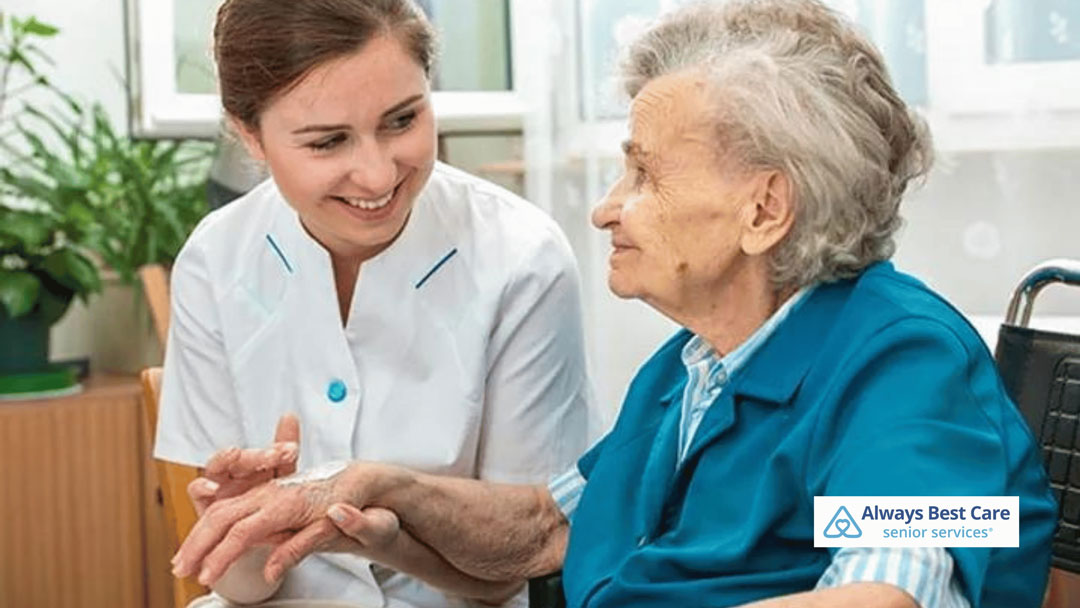
At Always Best Care, we understand the unique challenges that seniors face in managing psoriasis. Our team of compassionate and professional caregivers is dedicated to providing personalized support to help you maintain your health and well-being. Whether you need assistance with daily skincare routines, help with medication management, or simply a friendly face to offer emotional support, we’re here to help.Partnering with an in-home care provider can help you stay on top of caring for your psoriasis and handling flare-ups. A caregiver can help you work to avoid triggers, take good care of your skin, and follow your physician’s orders for managing your condition. They can also assist with a variety of tasks when you’re experiencing a flare-up and might not be feeling your best. Contact Always Best Care of Birmingham at (659) 200-5714 to learn more and schedule your free consultation.





